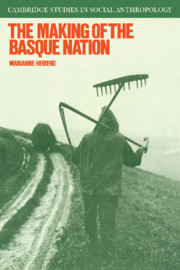Book contents
- Frontmatter
- Contents
- List of maps
- Preface
- Introduction: empire and the emergence of Spain
- Part 1 From plurality to Basque ethnic solidarity
- 1 The Basques in history
- 2 The foundations of the modern Basque country
- 3 History as myth
- 4 From the illuminated few to the Basque moral community
- 5 The moral community and its enemies
- 6 ‘España, una, libre y grande’
- 7 The moral community, from clandestinity to power
- Part 2 Inside the moral community: the village of Elgeta, Guipúzcoa
- Postscript
- Conclusion: ethnic nationalists and patron–clients in Southern Europe
- Notes
- Biblography
- Index
- Cambridge Studies in Social Anthropology
2 - The foundations of the modern Basque country
Published online by Cambridge University Press: 19 October 2009
- Frontmatter
- Contents
- List of maps
- Preface
- Introduction: empire and the emergence of Spain
- Part 1 From plurality to Basque ethnic solidarity
- 1 The Basques in history
- 2 The foundations of the modern Basque country
- 3 History as myth
- 4 From the illuminated few to the Basque moral community
- 5 The moral community and its enemies
- 6 ‘España, una, libre y grande’
- 7 The moral community, from clandestinity to power
- Part 2 Inside the moral community: the village of Elgeta, Guipúzcoa
- Postscript
- Conclusion: ethnic nationalists and patron–clients in Southern Europe
- Notes
- Biblography
- Index
- Cambridge Studies in Social Anthropology
Summary
The crisis of the foral regime
The modern Basque country – like Spain herself – emerged deeply divided. It was created out of the abolition of the foral regime. Foral abolition meant the political defeat of the rural notables and the further alienation of the peasantry. It also meant the final ascendancy of the expanding urban centres.
The loss of Spain's traditional overseas markets and the political changes and physical destruction caused by the War of Independence resulted in an acute crisis also in the Basque country. Typically the agricultural and urban sectors sought diametrically opposed solutions for their ailments. In the Basque country the Hispanicized urban and euskaldun (Basque-speaking) rural modes of life were conceived of as antagonistic social orders. The interests of the one could only be served at the expense of the other. Compromise was neither contemplated nor sought. The tensions produced erupted twice into civil war and after the final rural defeat resulted in the abolition of the foral regime in 1876.
After 1795 trade with the Americas had almost ceased. With the collapse of foreign commerce, the Basque bourgeoisie looked to the potential of a Spanish market and specifically the potential of a modernized Basque metallurgical industry in such a market for its economic salvation. However, such an economic change required radical political surgery.
Three aspects of the foral regime exercised a stranglehold over the possibilities of industrial growth. (1) The foral regime upheld rural society and the privileged position of the rural notables within it.
- Type
- Chapter
- Information
- The Making of the Basque Nation , pp. 35 - 44Publisher: Cambridge University PressPrint publication year: 1989



